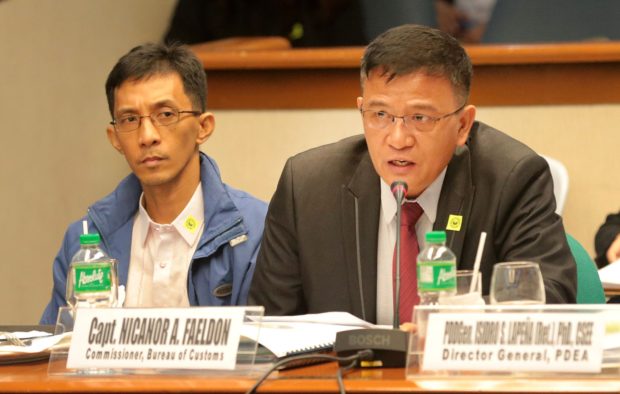
Customs Commissioner Nicanor Faeldon. FILE PHOTO by GRIG C. MONTEGRANDE / Philippine Daily Inquirer
Embattled Customs Commissioner Nicanor Faeldon on Friday defended his decision to hire almost 30 active and retired athletes as customs “technical assistants,” saying they were the “most effective intelligence information gatherers.”
“That’s precisely why they are there … because nobody expects them to be gathering information for the bureau … None of you will ever expect that they are part of the organization,” Faeldon told a press briefing.
Cover exposed
“But today, they are no longer effective because they have been exposed. They will never be effective. Their covers have been exposed,” he said.
Contrary to the perception of some lawmakers, he said the athletes, among them former Philippine Basketball Association superstars Marlou Aquino and Kenneth Duremdes, only signed “contract of services” and that they were not regular Bureau of Customs (BOC) employees.
BOC records showed that most of the contracts, which started on Aug. 1, 2016, were terminated by the BOC on June 30.
“[These] athletes cannot perform functions that fall within the job description reserved for regular (BOC) employees,” Faeldon said in a separate statement.
“[Their] services shall not be considered as part of government service under the bureau. The contract states that there is no ‘employer-employee’ relationship between them,” he said.
Quirino Rep. Dakila Carlo Cua, House ways and means committee chair, and Batangas Rep. Raneo Abu questioned Faeldon about his decision to hire basketball and volleyball players during the House inquiry into the smuggling of P6.4-billion worth of illegal drugs.
Abu said the designation of the athletes as BOC technical assistants could be tantamount to misuse of government funds, pointing out that they might have been hired just to play for BOC Transformers, the bureau’s official basketball team.
Image improvement
The BOC commissioner said they tapped the services of the athletes to help them improve the image of the BOC, long regarded as one of the most corrupt state agencies.
Mandy Anderson, Faeldon’s chief of staff, said the athletes were also instrumental in breaking down the “divide” among the customs personnel and in promoting cooperation and camaraderie in the bureau.
Besides, Faeldon said the athletes were “effective communicators of the bureau’s reforms—that is why they were assigned to the committee on personnel development.”
Faeldon said: “These players were also hired to send a message to the public that the BOC was serious in rebuilding its image in order to reverse public perception of being a corrupt agency.”
“We must change this perception by convincing the public and encouraging our employees to help reform the agency. We need the players to do that,” he said.

